#we both find the 'why is the rum gone remix' absolutely hilarious and as we were talking about this she referenced it
Explore tagged Tumblr posts
Text
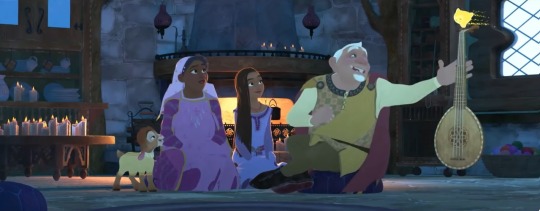
Yes, I know, I'm shocked too -- but once again, it seems, I have to talk about Disney's Wish. Truthfully, this entire analysis was one I never set out to write, but I felt like I had to after having a really good conversation with my mum about this deleted scene featuring Asha's grandpa, Sabino; the sentiment expressed by some Disney fans that its inclusion would've helped fix the film; and even the purported perspective that the development team was deeply unhappy about the corporate decision to cut it.
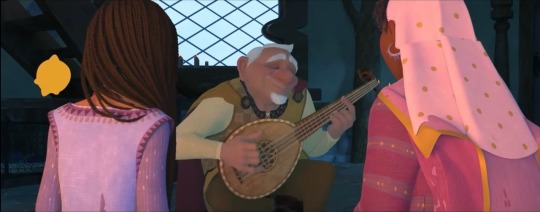
So first off -- do I think this scene is that magical missing piece that would've fixed Wish? Not exactly. I do think that Sabino putting the idea of wishes being worth fighting for into words for Asha that she even could've reprised later while fighting Magnifico could've been very powerful. Just imagine how much stronger the story would've been if Asha had used Sabino's song to rally the town against Magnifico -- not only creating the payoff of Asha making her dear Saba's wish of inspiring people as well as her own wish to make things in Rosas better come true, but ALSO bringing Magnifico's worst fears of rebellion against his rule to life in an ironic twist! But even if including this scene could've improved the film, I don't think it would've fixed everything wrong with its story and characters. It did, however, inspire that really fun conversation with my mum, and we realized together what this scene at least partially provides that the finished film didn't --
A reason to care about the wishes Magnifico hoards away.
When I was in college, I took a screenwriting class, and one of the most important lessons the professor taught us was to give your main character(s) a strong desire and then give your audience three strong, disparate reasons to root for your character in reaching their goal. This way, if one of the reasons doesn't resonate with a member of your audience, maybe another one will. The more reasons you give your character to want to succeed, the more people in your audience are likely to feel for your character's position and support them in their actions.

Let's use Disney-Pixar's absolute masterpiece Finding Nemo as an example, just for kicks. Marlin wants to save his son, Nemo, after he gets captured and taken away by human scuba divers. The audience wants Marlin to succeed because his reasons include --
Love. Marlin loves his son very much and is very protective of him, partly because Nemo has a disability that Marlin worries puts him at particular risk being on his own.
Past trauma. As seen in the prologue of the film, Marlin lost the entire rest of his family to a horrific barracuda attack that also resulted in injuring Nemo while he was still an egg, so Nemo is the only family Marlin has left.
Guilt. Marlin feels responsible for what happened to Nemo, because they were in the midst of a fight about Marlin's helicopter parenting when Nemo put himself so close to the human boat and got captured.
The thought process behind this writing trick is that you want your audience to care about what your character is working toward. This is how you get an audience really emotionally invested in their struggles and story, and it also helps define who the character is as a person, understanding not just what they want, but seeing the lengths they'll go to in order to chase that desire. And this is what Wish seems to understand symbolically, but not enough to use this knowledge while shaping its screenplay or characters.
In the finale of the film, all of the people in Rosas whose wishes were taken can still gather enough "stardust" or "magic" or "dreaming whatever" to defeat Magnifico without them. The magic is inside of them, even without the contents of the bubbles Magnifico took from them -- because our wishes, dreams, and ambitions come from who we are, as people. They're a piece of us -- they're informed by who we are -- our happy memories, our past scars, our personalities and hobbies and values. What makes dreams coming true so beautiful is seeing someone become a more complete version of themselves through it!
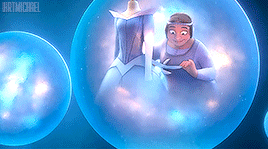
And yet...what do we learn about any of these characters that tie into these wishes and why it's so important their wishes be returned and/or granted? What visually communicates that these wishes are so integral to these people's personalities and souls that they're a pale shadow of who they used to be without them? What emotional justification is there for anyone to care if Rosas's citizens achieve these flights of fancy? Are there any real stakes or grave consequences if those wishes aren't granted?
Why do we care if this one lady wishes she could fly, or this other one wants to make dresses? What do we care if this one person wants to sail a ship and travel the world? This one guy wants to climb a mountain or something, but...so what? We don't know any of them from Adam! The film tells us that these wishes are really important to these people, but we don't get any emotional reasons to be invested in whether or not these people's individual wishes come true.
Even characters we do meet like Simon -- what about him made him want to be a knight? Where did that wish come from, in his character? Was it fueled by misguided patriotism? A desire for glory? Being bullied as a child and wanting to prevent others from going through the same thing? We have no idea! Imagine how much more Simon's "betrayal" scene would've hurt if we'd gotten to know Simon as this dreamy, idealistic person who grew up reading fairy tales about knights bravely protecting their kingdom and being heralded for it, only for that wish to be twisted by Magnifico to make Simon serve his king blindly with no free will of his own. Imagine how much more interesting of a character Simon would've been if there had been real context behind that wish he'd made and given up, and how much more interesting his relationships with his friends could've been as a result.
What about Asha's mother? Her wish is treated as incredibly important in the film, since Asha tries to steal it from Magnifico like she did Sabino's and Asha and her family react with such upset when Magnifico crushes it, and yet we never once learn what the wish even was. Even when the wish is reformed and returned to Asha's mother, we STILL never learn what it was and by extension what it meant to her mom and why it was a bad thing that it got crushed. Why should we believe this wish of Asha's mum's is so important if we never even learn what it is? Because the film said it's important? In the immortal words of Will Turner,

(source)
Just look at Joe Gardner in Pixar's Soul. Would you care so much about him wanting to get back to the world of the living if you didn't learn through the film that he'd been dreaming of playing jazz since he was a child and had finally landed this big gig with a jazz band after years of rejection and his own mother never supporting his dream right before dying? Would Joe have connected with 22 the way he had over the course of the story if it weren't for not only his goal, but the character, passions, and world view that fueled his pursuit of that goal in the first place?

My mum, while we had this discussion of ours, put forward her own experience. When she was a young woman, she dreamed of having a family of her own: a husband, 2.5 kids, a house with a white picket fence where people could gather together. Over time, though, Mum kind of resigned herself to the reality that it probably wasn't going to happen -- she was pretty solidly focused on her career, she hadn't had much luck in her long-term relationships, and she'd gotten to an age that having her own children was incredibly unlikely. This doesn't mean my mum lost that desire for family -- it's still a part of her, and it informs who she is as a person. She's always taken care of the many cats she's had over the years as if they were her children. She made and has kept life-long friendships with people who've become like siblings to her. She even ended up becoming something like a mother figure for her ex-boyfriend's daughter from a previous marriage, while she and that boyfriend were together. And when I was conceived (pretty miraculously too!), my mum never hesitated for a moment about whether or not she wanted me. Even if my father had chosen not to stand by her and me, she would've pursued that dream of motherhood she'd thought was lost to her all the same.
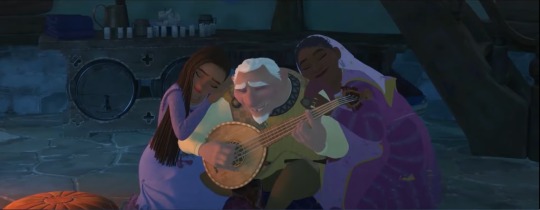
THIS is what the deleted Sabino scene has that the finished film doesn't, though still in a bite-size amount. The reason the filmmakers give us for why we should care about Sabino's wish (and, one could argue, the town's wishes) is that when his wish is returned to him, it allows Sabino to connect more deeply with his granddaughter and his daughter-in-law through the music he's so passionate about.
The reason we the audience should care about Sabino's wish is the connection he makes with others.
We still don't know where that wish came from in Sabino's character or back-story, and the theme of connection through one's dreams is something that certainly could've been explored more if it had been kept...but for the first time, through this deleted scene, the filmmakers gave us a reason to care about that little magic bubble besides just telling us that they represent a heart's deepest desire and we should want everyone's wishes to come true because wishes are good. (Which honestly has a lot of problems -- the film never even bothers to explore any scenarios where wishes could truly be dangerous or morally wrong to grant, such as a wish to rule this particular kingdom or that this one person will marry you, regardless of their opinion on the matter.)
The song Sabino sings in this scene says that if a wish is powerful enough to fill your heart and make it "close to breaking," then it's one "worth making." But to tell a story worth telling and create characters worth rooting for, you need to show -- not just verbally explain -- why your audience should care.
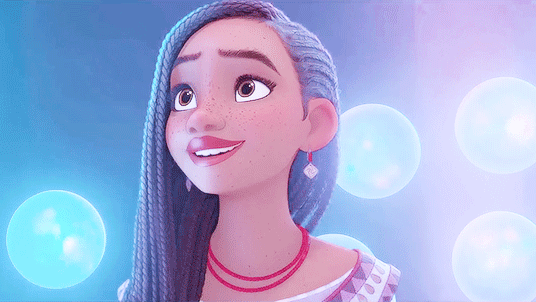
#disney wish#disney#wish (2023)#wish#opinion#analysis#sabino#asha#oh boy here i go#for the record that will turner reference is my mum talking#we both find the 'why is the rum gone remix' absolutely hilarious and as we were talking about this she referenced it#and I just HAD to include it XDDD
32 notes
·
View notes